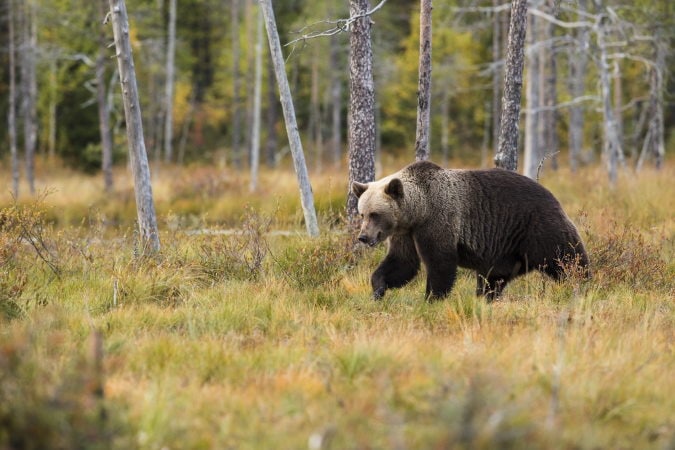We’re all worried about meeting aggressive wild life when we’re out hiking. Most of the time (we’d guess at least 99.99%) wild life doesn’t bother us in the slightest, and we don’t bother it either. We’re both out there, enjoying our lives in nature and respecting each other’s boundaries and looking not to be a bother. Until that is no longer an option. Let’s take a look at some self-defense options in the wild.
How likely are you to meet a bear on a hike?
You are extremely unlikely to meet any kind of bear while you’re hiking, even in bear country. Bears are solitary, quiet creatures that generally wander around and scavenge for food instead of hunting.
Bears generally don’t like humans, and most of the time, aren’t curious enough to bother us. When they hear us coming (or even likelier, smell us, as they can smell something 20 miles away), they prefer to avoid us completely. If they smell food, they might be motivated enough to scavenge around camp tents, which increases the risk of contact between bears and humans.

Use airtight, bear-resistant food containers when you’re camping in bear country for added protection.
If you notice bear tracks, avoid that area or be louder on the trail. Bears will avoid you if you’re loud. Never run from a bear, or it’ll think you’re prey and attack you.
Bears usually attack people in two scenarios: they’re either scared or the mamma bear is protecting her two cubs.
What’s the chance of a bear attack?
The chance of a bear attack is extremely low. 11 attacks per year in North America (count Canada in).
Compare this low number to the amount of active hikers in 2018 (47.86 million hikers); you’ll notice that the chance of a bear attack is almost irrelevant.
23 people were killed by black bears from 1900 to 1980, and only 73 people died to any kind of bear since the 1870’s.

If we go by chance, there’s almost no need for any type of bear spray, or a firearm as the chance you’ll meet a bear is extremely low, let alone provoke it.
But, while the chances are very, very low, it pays off to be prepared. Never forget your first aid kit (it might save you, or someone else), and if you’re hiking in bear country (any kind of bear), have a can of bear spray in an easy to reach pocket.
How effective is bear spray?
In short, bear spray is 98% effective at deterring a bear. It’s a strong smelling capsaicin spray, similar to the pepper spray or mace that policemen use.
Most bears won’t think twice when their nose and eyes start watering and burning, and will back off.
Compared to the bear spray’s 98% success rate, firearms have a 95% rate of successfully stopping a brown bear charge. Bear spray isn’t hard to aim, but you should heed these bear spray tips.
What’s stronger? Bear spray or self-defense pepper spray meant for humans?
Pepper spray for humans targets humans specifically, and bear spray has different active ingredients that target bears.
While pepper spray might work on bears, it shoots out a small cone of very “spicy” spray that’ll incapacitate an aggressive human at close range. You might not hit the bear in the face. If you don’t hit the bear with the cloud of orange mist, it will be undeterred.
Pepper spray is “stronger” as aggressive, combative people are not deterred by pain, and people may choose to fight through the pain, the tears and the swelling.

Bear spray shoots out a large, wide cone that has a high chance of hitting the bear’s eyes, face and nose. It covers a wider range, and is thus a lot weaker than pepper spray, but this is okay.
The bear will most likely get surprised, confused and scared by the spray’s noise, orange colored mist, and the pain. The bear then usually runs away.
The effects of bear spray last for about an hour, and then completely stop, which means that the bear is completely unharmed and can go about his business.
Should you just carry a firearm?
Bear spray is 98% effective, while guns are 95% effective. Just this number tells you that you’re better off with bear spray.
Most bears are scared of humans, noise, and gunshots and will be deterred if you fire at them (even if you don’t hit them). Bears are big, heavy and hard to hit when they charge at you.
Bullet wounds don’t hurt in the moment, and even if you hit the bear it might still be undeterred, and as such we suggest that you go with the more effective, easier to aim, non-lethal option. Leave no trace applies to hurting animals, too.
The other benefits of bear spray compared to firearms is that some national parks ban firearms, and bear spray is a lot lighter than a loaded firearm.
Should you use half-empty or expired cans of bear spray?
No; you have about 5-7 seconds of bear spray in your canister, which is enough for 3-4 solid sprays. Bear spray can go bad, and it expires in about 4-5 years. It says so on the can.
Theoretically, think of your half-empty/expired can of bear spray like a revolver that has 2 shots instead of 6; it’s not something you’d trust your life with. If you know someone that hikes in bear country, you can buy a can of bear spray as a gift.
If you have half-empty or expired cans of bear spray, take those cans to a dedicated bear spray recycling company. Do not throw them in the trash, as the cans might burst and harm someone. These cans are not exactly landfill-safe, and you might be responsible for harming someone by accident.
Do not throw the cans into a fire or puncture them yourself, as they’ll explode and hurt you.

In conclusion
In short, we’ll recount the main points of this post.
- There’s a very low chance you’ll ever encounter a bear.
- There’s an even lower chance that it’ll attack you.
- You should avoid bears if possible. Keep your food safe.
- Bear spray is a very effective deterrent against bears. It works.
- Firearms are effective deterrents against bears, but bear spray works better, is legal in most parks, lighter, and non-lethal.
